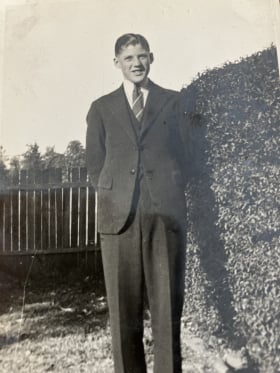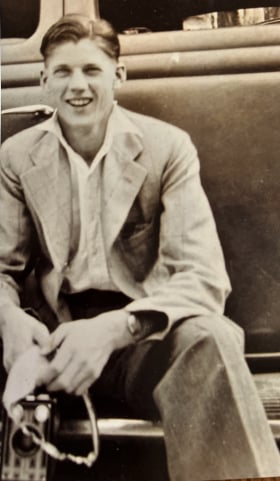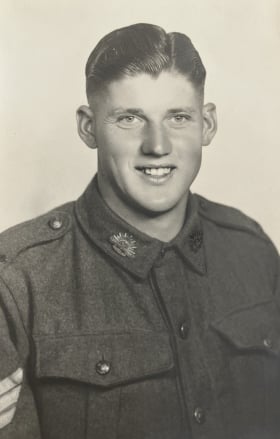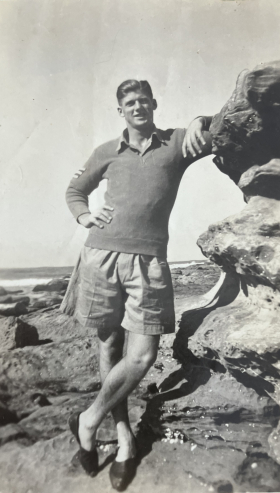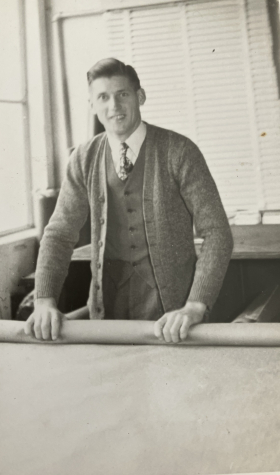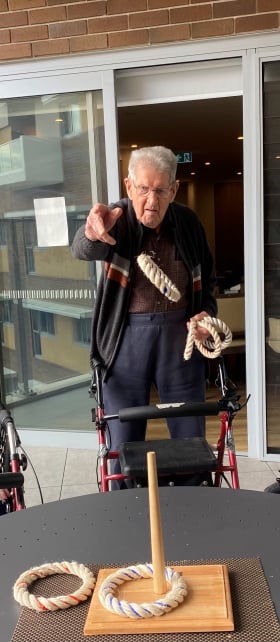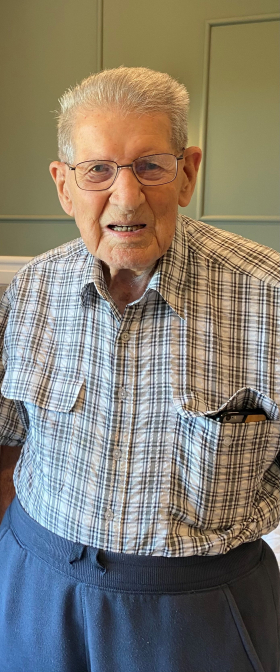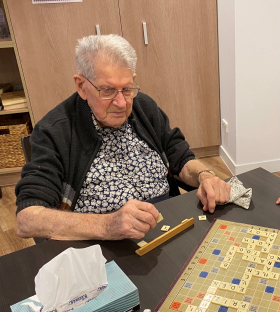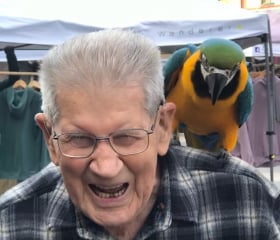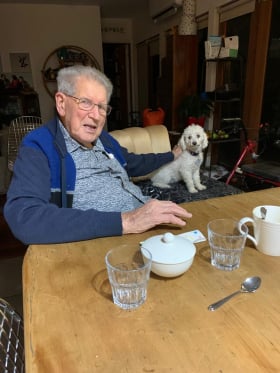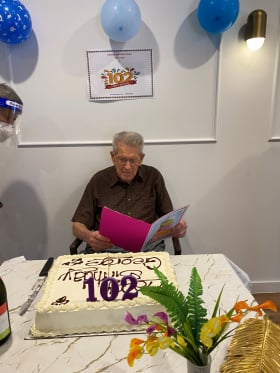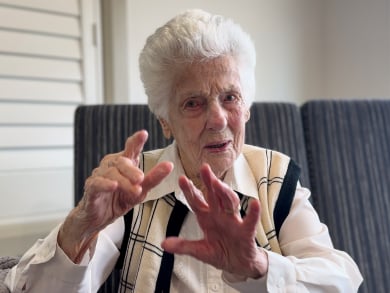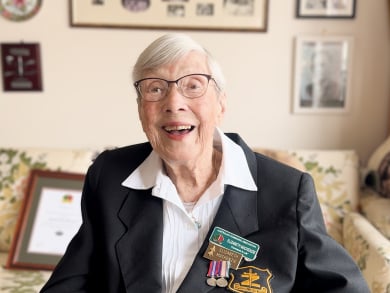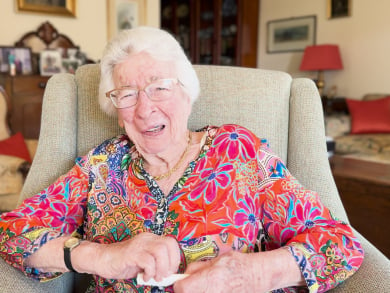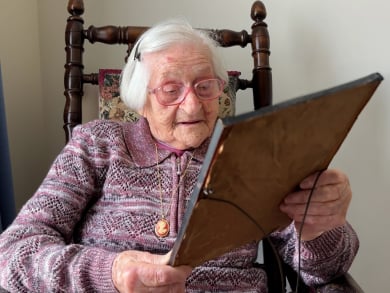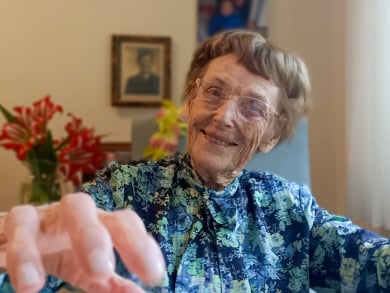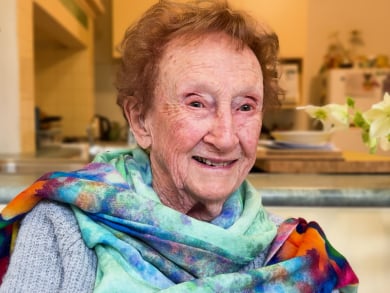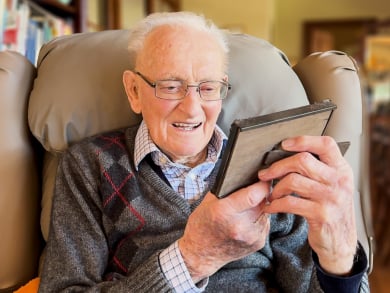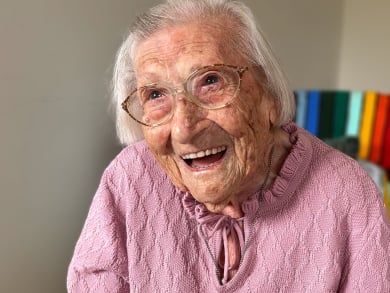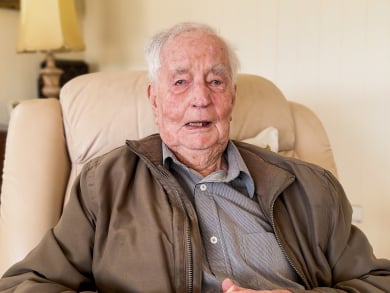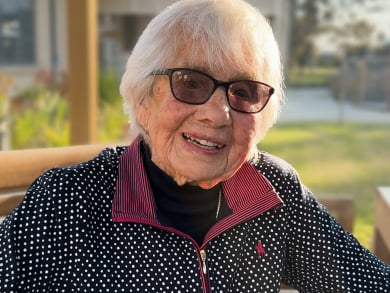Closed captioned icon
View audio transcription
My name is George Edward Snow.
I'm 102 years old.
I was born at Milsons Point,
Sydney, near the swimming pool.
My mum, Enid, like most mothers
- pretty loving people
and she was a lovely person.
And father, Alfred.
Alfred was an engineer
with the government railways at Redfern.
Two sisters, Jessie and Marie.
After 12 months after my birth,
they decided, I don't know for why,
to move to Wentworthville.
Darcy Road, Wentworthville,
and that's where we lived in Sydney myself
for the rest of our lives.
There was Depression
on those early days of my life
and you realize when you're older
that they,
no doubt, denied themselves things
so we didn't go hungry
because we never noticed it,
that this situation
was there,
because we seemed to have enough to eat.
But I understand
that went on because there was only a
certain allowance to
people for food, for the money for food.
I know my grandmother
made a lovely apple pie.
I can't describe it at the moment
but it was a
It was a beautiful apple pie for us.
It was quite an event to visit them
because they went out of their way
to sort of give us nice food
and entertain us and call my cousins over
so we can sort of play together.
My grandfather,
he built us a radio because in those days
it was like a big box,
all these valves sticking up out of it.
We were the only ones with a wireless
in the street at that time.
I think my mother,
because being there during the day, would
probably listen to some of these stories
that they had going on and on forever,
you know, sort of thing.
It was quite an event
to have a wireless anyway.
It really started when I was nine.
So we organized to be in a
cricket competition.
We used to play on Wentworthville Oval there,
which is still the oval,
the cricket oval.
But anyway,
they said, "you'll have some away games".
What are you going do?
And fortunately, two of our boys,
their father had a big car
and he was like a taxi man
at Wenty Station.
It was an American car
he had, that was a bit bigger than normal.
And of course he said, "I'll
take you away".
Now we had
11 boys, one girl, one chap's sister was the scorer
and the driver, Mr Kelly.
And cricket gear was on chrome bars
on the back of the car.
And away
we went with 13 people in the car.
Now, in those days,
you put your hand to the right to turn
right and your hand up
right out the window to stop.
It must have been interesting
to see it go.
Going around.
I went to Wentworthville school.
What did we do?
We had to 6th class there
and then I went to
Parramatta Intermediate near the station
there.
That school.
I did three years there
and I thought I'm going to get a job.
So I walked down the street
there at Parramatta.
Murray Brothers of course stood out
and I walked in there anyway
and saw the chap that engages staff
and he gave me a job straight away
and on the menswear.
Was a salesman.
Because when you're there at 15
you're the the boy that sweeps
the floor, tidies
up, got rid of the rubbish.
Does all the jobs...
Anyway, I was with them
completely for 43 years and they had
the deliberate intention
to promote their own staff,
not bring them from outside
unless there was something special
they had.
There was a couple of ladies departments
you needed someone
that really had experience
and knew what they were talking about
so they settle these things for
women, particularly.
So...
then they made me a manager,
manager of a department to start off with.
Actually it was
floor coverings.
And then they made me buyer.
We go to Sydney, buy
all this stuff, you know, whatever it is.
So I get a call
from our manager
to say we'd like you to go and manage
a store in Cootamundra.
You know, and you say Cootamundra?
Where's Cootamundra?
That's where Don Bradman was born.
one of the staff members
who was a very progressive young man
and as he got older, really good because
they picked him out to manage the store.
He said, "Now you gotta ask your wife,
is she happy to go?" You know, they did it
all good, you know, she's happy to go,
because you'll be going holus bolus .
And I was there for six years.
It was six years
and they said
now we would like you to go and manage a shop
or manage a department, for a start,
in Canberra.
It was owned by a family, Murray Brothers.
Their grandfather came out 100 years ago
and of course he had two boys, three boys.
So one of those boys
was the managing director
in the first instance.
He decided he didn't want to work anymore,
so he decided to close the shop down.
I was actually called up.
1941 I think it is.
1941
So I decided, like a lot of others,
that we would join up.
I decided to go into the artillery one
And in 1945,
our unit, a lot of others,
it was a big show.
A dawn landing at May 1st
in Borneo.
Borneo is made up of land
and islands all around it.
And this was an island called Tarakan.
I was the sergeant in charge
of a 25 pound gun
and the crew
and there were similar ones like that.
There's about eight in the unit.
Two lots of four and
we're on special boats with landing gear.
They have these things that drop down.
They drop down.
Get right up or they'd have to have some
sort of plank.
I them planks that the wheels could run on
to get them off.
If you've got enough people there,
you can man-handle them.
They pick up speed, turn the engine off,
and they're supposed to then float in
on their own momentum
sort of thing - in as far as they can go.
So at dawn
we landed there.
Lock, stock and barrel.
Guns firing in all directions and and
the firing might be every 10 seconds.
Sometimes they do that, repeated firing
and everyone's got to be there
putting these shells into the gun
to fire on time.
We were firing at them
200 yards in front of us.
The only thing there was a sniper,
could have been two snipers, in the area.
They were there at any time;
they're trying to pick up any...
with the gun, pick up someone,
if they can sight them.
We lived with the gun.
Beside the guns.
And I can't remember now
whether I had a stretcher.
Of course, we'd never change clothes....
because some of them were about
200 yards in front of us.
So you had to be alert at all times.
So I suppose we we would have had people
awake all the time in shifts.
Strangely enough I wasn't a bit scared.
I suppose it is there though in you.
If somebody was all of a sudden
in front of you,
immediately in front of you,
with a gun trying to shoot you.
But apart from this chap who was in a tree
somewhere, we sort of disregarded him.
I think when you've got something to do,
you're so occupied and doing it
and getting it done,
right on time, you know.
It went out of your mind.
The Japanese were overcome
there in due course
and we just stayed there
'til the end of the war.
Then we were taken back to Sydney with a
British
carrier, aircraft carrier, a huge boat
and it was quite funny
because they had ... stretchers
with white sheets and pillows,
which we'd never seen for a while,
and took us back to Sydney
and there was nothing better
than be laying off the heads
there at 5 o'clock in the morning.
And of course, everyone knows
we're coming.
The wife and...
I'd been married
of course during the War, and
to greet us home.
Dear oh dear!
That's a good one.
Well, it probably would have made
that night I took Kath home
from that dance.
Yeah, that would have been it, I'd say.
Her name was Kathleen Kirk.
She lived at Westmead too
so it was a fair walk.
You don't notice the time when you got
someone like that, that you love.
You know, she...
there was something about her.
Something about her.
And I had seen her many times
walking around.
I don't think I'd had the opportunity
to actually speak at those occasions
because I would look at her
and she was at lunch
and I, I don't think
I'd actually formally met her.
They used to hold dances
at the Masonic Hall in Wentworthville.
Garfield Street.
We used to go as a group there
because some of the girls
that we had to walk them home
in those days.
That's where I met her for the first time.
I said to myself, "I'm
going to marry you".
That's how nice she looked.
She was a good dresser.
Always neat.
Well they had to be fairly neat
working in the shops, but she...
she was just neat.
There was just something about her.
Actually,
there was a funny thing, you know.
I was 18, I don't think I'd ever taken
a girl out, even though we'd
taken some of these girls home.
I suppose you look at girls and girls
and there's different girls and you know.
We're all friends and that.
But when you come to marriage,
it's a bit different, isn't it?
I was married in 1942
and we were together for 66 years.
It was wonderful.
We had a wonderful life.
Well, you love them
and support them in every way possible, really.
I'm just trying to think of things you do
you know, 24 hours a day.
And we were lucky in that way.
And we did a lot of trips together,
which I can tell you about later.
But yes,
I think well, feeling for each other
in the maximum way
you can't do better than that, can you?
But she will always be remembered forever
and ever and ever.
She was that sort of a person.
Yes...
Thanks To
Lax Pudaruth
George Snow
"we landed there... guns firing in all directions"
A WWII veteran, he fought far away but found his love close to home
George recalls his life, his friends and his cricket in Wentworthville in western Sydney in the 1920s and 1930s.
He left school at 15 to work for Murray Bros, Parramatta, where he remained for 43 years.
He didn’t have to go far to find the love of his life. He wed a Westmead girl during the War and they were together for 66 years.
In WWII, George fought for the Australian Army on Tarakan Island in Borneo. He was a sergeant in an artillery unit. He recalls the joy of having white sheets and pillows on his voyage home.
Age in Video
102 yearsDate of Birth
24th January 1920Place of Birth
Milsons Point, NSW, AustraliaThanks To
Lax Pudaruth
